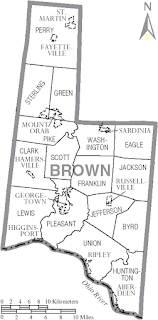Practically all of my ancestors were law-abiding citizens. They farmed, worked in various businesses, were good citizens, and did not get into much trouble. So when I come across one who did not do that, I really like it. My great times 3 grandfather, Andrew Cochrane Johnstone, certainly fits that later category.
Andrew James Cochrane was born on May 24, 1767, in Scotland to Thomas Cochrane, the 8th Earal of Dundonald and Jean Stuart. In 1793, he married Georgianna Johnstone, and took on her last name. He served in the army, as a member of Parliament, and as governor of Domenica. These posts were not without controversy, accusations, and trials.
However, of all the activities he engaged in, the most famous is known as the “Great Stock Exchange Fraud.” In 1814 England was at war with France. The English believed that shortly Napoleon would be defeated and the Bourbons would be restored to the throne of France.
 |
| Napoleon |
On February 21, a Colonel du Bourg, who said he was the aide to the British Ambassador to Russia, landed in Dover. He claimed that Napoleon was dead and the Bourbons were back on the throne. After arranging for the information to be sent to the Admiralty in London by semaphore, he then set off for London himself, spreading the work of Napoleon’s death as he traveled.
Such welcome news was believed and had a very positive effect on the London Stock Market. It rose dramatically. While stock values briefly fell with no confirmation of the death, prices again rose, when three men dressed as French Offices rode through London, distributing flyers proclaiming “"Vive le Roi! Vivent les Bourbons!" However, in the afternoon, when the British government could not confirm Colonel du Bourg’s announcement, it declared Napoleon’s death a hoax, and stock prices immediately fell to their former level.
 |
| Lord Thomas Cochrane |
Andrew Cochrane Johnstone, who is believed to be the one who conceived this fraud, immediately proclaimed his innocence both in the newspapers and in Parliament.
The men were tried on June 8, 1814 and two days later a verdict of guilty was handed down. Andrew Cochrane Johnstone was sentenced to a year in prison, a fine of one thousand pounds and an hour in the pillory. However, before his sentence could be served, he fled England, never returned, and left several children with their mothers.
Andrew Cochrane-Johnstone died in Paris, France in May of 1833.
In a conversation, I would definitely have a few questions for Andrew. First, were you the primary person who made up this story? Did you really think it would succeed? What about those children? Did you provide for them after you left? Did you ever have any contact with them? Where did you go after you left England? Any regrets?
















